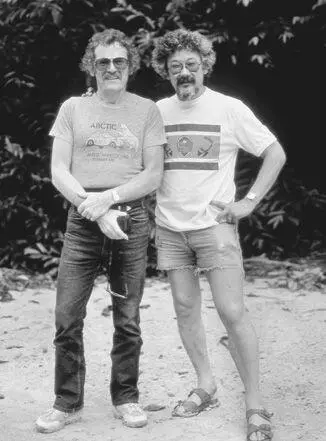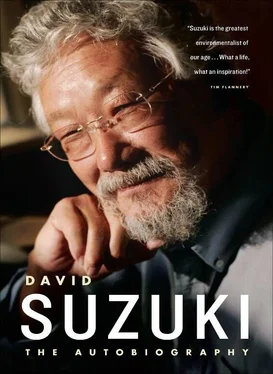Our plan was to visit the lab site and stay overnight. An open truck picked us up as arranged and took us the fifty miles into the forest to the trail leading to the camp. As we entered the great Amazon forest, the impact of the road's existence became clear — it was a slash of dried red mud that animals, including birds, were reluctant to cross because they would be exposed and vulnerable; roads can be barriers to wildlife movement as much as fences are. And creeks were simply plowed through. As we wound along the road, it began to rain, a tropical torrent, and soon the truck was slipping and sliding up and down the hills as if we were on a carnival ride. Eventually we had to abandon the vehicle and walk. The rain was so intense that it drove straight through Tara's umbrella, to everyone's amusement.
Finally we reached the campsite. Our dreams of putting our clothes in a dryer were dashed. All we found was a concrete pad with a thatched roof and hammocks strung under that. Luckily a tarp covered a kitchen area, where a cook fed us caipirinhas (a delicious rum drink) and a magnificent meal of rice and tambaki, a large fish that eats nuts that fall into the water from the trees. I went out along a trail with my fishing rod and caught a couple of small fish, which I let go.
After dinner, Simon and Guujaaw picked up a plastic dishpan and thanked the cook by beating out a rhythm and singing feast songs from the coast of British Columbia. Several of the station's researchers joined us, including Barb Zimmerman, our Toronto translator and an expert on amphibians and reptiles, who had suggested the station trip in the first place. She took a group of us out late at night to look for frogs. It was very dark, and we shared tiny flashlights as we slipped and fell and cursed along the trail.
Barb was really impressive, finding the tiniest frogs on tree trunks and under fronds, but when asked about a bird that squawked away when we came along, or an epiphytic plant on a tree, her answer was, “Don't ask me, I'm a herpetologist.” The reductionism of science demands this. But when I was in Aucre, every time I asked Paiakan about an insect, fish, or plant, he had a name for it and could tell a story about it.
From Manaus we flew to Belém. En route we spied a newspaper with a picture of Paiakan in a hospital bed! Had the gathering at Altamira been derailed by violence? Tara grabbed the paper and determined that Paiakan had appendicitis; he still intended to appear.
Our flight to Altamira was scheduled for 4:00 am. Unknown to us, the airline was heavily overbooked because so many journalists wanted to go to the unprecedented protest at Altamira. We had reservations, but when all forty of us showed up more than three hours early, we were told there were only three seats left and the plane would take off as soon as it was full — two hours ahead of the scheduled time. I learned then that yelling in anger doesn't get you anywhere in Brazil. The people behind the desk simply melt away, leaving you fuming by yourself. I was devastated — all that planning, and here we were stuck in the Amazon. And only Tara spoke Portuguese.
It was decided that Rosie Mosquito, Gordon Lightfoot, and I would take the three remaining seats and Tara would try to charter a plane for the rest. As we flew off, I was sure I wouldn't see Tara again till I got back to Canada. After we had checked into our hotel and unpacked our luggage, I went downstairs and to my astonishment found Tara and the rest of the gang checking in. After we had left at two in the morning, Tara had found out where aircraft could be chartered, negotiated two small planes for thirty-seven people, collected the money from the gang for it, and landed in Altamira right on our heels. Her gift with language had paid off in spades.

Gordon Lightfoot and me on our way to the research station near Manaus
When we arrived at Altamira, everyone was abuzz with the news about Paiakan's emergency appendectomy only days before. I was sure that without him, the protest gathering could not possibly succeed. To our relief, he was there at the opening — gray and weak but still clearly the leader. He wore a striking headdress made of dark-red and blue feathers as he barked orders. It was a huge event, with some six hundred Kaiapo representatives and forty other tribes; hundreds of Brazilians, from officials at Eletronorte, the power company proposing to build the dam, to the National Indian Foundation (FUNAI), the Brazilian government organization for Indians; environmentalists and reporters from around the world, and hundreds of armed soldiers ringing the walls inside the building
The media were in a frenzy. Everything was so exotic that photographers and camera operators couldn't miss — just point and shoot. Each tribe of Indians wore its own characteristic patterns of body paint and headdresses of feathers, leaves, and grass. The meeting took place in a large building with a dirt floor covered in palm fronds. Soldiers in full gear lined the walls, and the various tribes sat on the floor in front of a large head table raised on a dais. After pouring in tribe by tribe with rhythmic chants that raised the roof, the Indians covered three-quarters of the floor in a large horseshoe around the table, and the onlookers, including us, and the media occupied the space between the Indians and soldiers.
Within the great hall, the officials from government and Eletronorte presented and rationalized their plans for Plano 2010 and the dams as best they could, but they were confronted with angry Indians and their Brazilian supporters including unions, rubber tappers, and human-rights organizations. An electric moment that no one who was there will forget occurred while an Eletronorte official was speaking: an elderly Kaiapo woman jumped to her feet, waved a machete, and began to harangue the Kaiapo warriors. I later learned she had asked whether the men there were fighters, and if they were, why didn't they kill these people who were oppressing them?
Even though I couldn't understand a word of her speech, it was clear that she was furious and was whipping the crowd up. The tension was unbearable; we bystanders were all very aware that we would be caught in any crossfire if violence or shooting broke out. To punctuate her remarks, the woman walked up to the head table, raised her machete at the Eletronorte official, and slapped his cheek with its flat side. A yell went up as the soldiers raised their weapons.
To his credit, the official didn't move a muscle. In the heat of that moment, I looked over at Tara and pointed to the floor; if violence broke out, we sure wouldn't make it to the doors. Paiakan exhibited his superb leadership skills as he stood slowly and held out his arms. Speaking softly and carefully, he calmed the heated crowd and eased the tension by saying that the woman's dramatic act was not aggression but theatrics.
To minimize contact with non-Indians and therefore reduce the chance that indigenous peoples would pick up a disease, a traditional village was built in the forest far outside town. Paiakan invited the Canadians to visit the village one night. It was wonderful. We were fed traditional food cooked on fires, and Guujaaw and Simon created a sensation when they appeared in full First Nations regalia, dancing, drumming, and singing.
I vividly remember the attendance of Pombo, a chief who went on to a political career in the Brazilian parliament but who died only a few years later. He had a headdress that resembled a woman's swim cap covered in feathers, and he gave it to Simon as we left. Raoni, the chief befriended by the English singer Sting, with the striking labret in his lower lip, was at the fireside along with Paiakan.
Читать дальше



![David Jagusson - Devot & Anal [Hardcore BDSM]](/books/485905/david-jagusson-devot-anal-hardcore-bdsm-thumb.webp)









